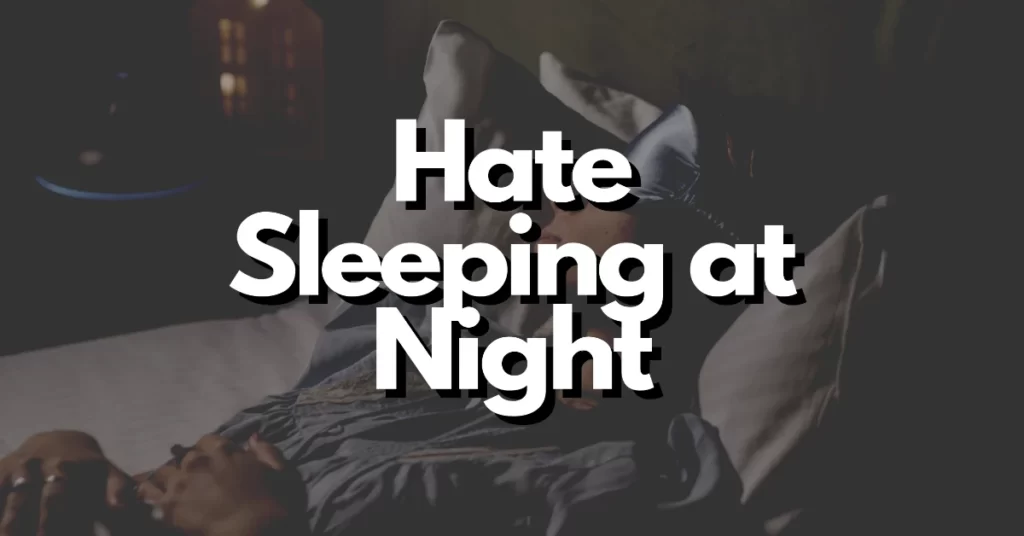Experiencing difficulty or aversion to sleeping at night is a common issue that many individuals face. The reasons behind this phenomenon can be multifaceted, stemming from various factors such as lifestyle choices, sleep disorders, anxiety, or environmental influences.
In this article, we will explore the potential underlying causes of hating to sleep at night and examine strategies to improve sleep quality and establish healthier sleep routines. By understanding the reasons behind this aversion and implementing effective sleep hygiene practices, individuals can work towards better sleep habits and overall well-being.

Table of Contents
Insomnia and Sleep Anxiety: Understanding the Psychological Factors Contributing to Disliking Sleep at Night
For some individuals, the night becomes a battleground of restlessness and anxiety, rather than a sanctuary of restful sleep. Insomnia, characterized by difficulty falling asleep, staying asleep, or experiencing non-restorative sleep, can contribute to a dislike of sleep at night. Additionally, sleep anxiety, which involves excessive worry or fear about sleep and its consequences, can further intensify negative emotions surrounding sleep.
Psychological factors often play a significant role in disliking sleep at night. Stress, worries, and racing thoughts can invade our minds as we lie in bed, making it challenging to unwind and fall asleep peacefully. Past negative experiences with sleep, such as traumatic events or chronic sleep disturbances, can also contribute to sleep-related fears and aversions.
Additionally, underlying mental health conditions, such as anxiety disorders or depression, can disrupt sleep patterns and lead to an association of sleep with negative emotions.
To address the psychological factors contributing to disliking sleep at night, it is essential to develop healthy sleep habits and implement relaxation techniques. Practicing good sleep hygiene, such as maintaining a consistent sleep schedule, creating a relaxing bedtime routine, and creating a comfortable sleep environment, can promote better sleep quality.
Cognitive-behavioral therapy for insomnia (CBT-I) can also be beneficial in addressing negative thoughts and emotions surrounding sleep and promoting healthier sleep patterns.
Circadian Rhythm Disruptions: Exploring How Shift Work and Irregular Sleep Patterns Can Affect Nighttime Sleep
Our bodies have evolved to follow a natural internal clock known as the circadian rhythm, which regulates our sleep-wake cycles and various physiological processes. Disruptions to this rhythm, such as those caused by shift work or irregular sleep patterns, can interfere with our ability to fall asleep and stay asleep at night.
Shift work, particularly night shifts, can be challenging for our bodies to adjust to because it goes against our natural circadian rhythm, which is synchronized with daylight and darkness. Working during the night and sleeping during the day can lead to difficulties falling asleep due to the exposure to daylight and challenges in achieving restorative sleep during daylight hours.
Irregular sleep patterns, such as those resulting from inconsistent sleep-wake schedules or frequent changes in sleep times, can also disrupt our circadian rhythm. Our bodies thrive on regularity and predictability, so inconsistent sleep patterns can make it difficult for our internal clock to align with our desired sleep schedule.
To mitigate the impact of circadian rhythm disruptions and improve sleep quality, it is beneficial to establish a consistent sleep-wake schedule, even on days off. Creating a sleep-friendly environment, using techniques such as exposure to natural light during the day and minimizing light exposure at night, can help regulate the circadian rhythm.
Additionally, practicing relaxation techniques and implementing a calming bedtime routine can signal to your body that it is time to wind down and prepare for sleep.
Environmental Factors: Identifying Sleep Disruptors in the Bedroom That May Contribute to Disliking Sleep at Night
The environment in which we sleep plays a crucial role in our ability to relax and feel comfortable at night. Various environmental factors can disrupt our sleep and contribute to a dislike of sleep at night. By identifying and addressing these sleep disruptors in the bedroom, we can create a more conducive space for restful sleep.
Noise can be a significant disruptor, as loud sounds from outside or within our homes can disturb our sleep and prevent us from falling asleep or staying asleep. Implementing soundproofing measures, such as using earplugs or a white noise machine, can help create a quieter sleep environment.
Light exposure, particularly from artificial sources, can interfere with our body’s natural sleep-wake cycle. Bright lights, such as those emitted by electronic devices or streetlights, can suppress the production of melatonin, a hormone that helps regulate sleep. Using blackout curtains or wearing a sleep mask can help minimize light exposure and promote a more restful sleep.
Temperature and comfort also play a crucial role in sleep quality. Extreme temperatures, whether too hot or too cold, can make it difficult to fall asleep or stay asleep comfortably. Finding the optimal temperature for your sleep environment and using bedding that promotes comfort and airflow can contribute to a more restful sleep experience.
Creating a sleep-friendly environment includes keeping your bedroom free from clutter and distractions. Keeping electronic devices out of the bedroom or using blue light filters can reduce the impact of screen time on your sleep. Additionally, optimizing the comfort of your mattress and pillows can greatly enhance your sleep quality and overall sleep experience.

Underlying Health Conditions: Investigating Medical and Psychological Conditions That Can Impact Sleep Quality and Lead to Disliking Sleep at Night
Disliking sleep at night may be associated with underlying medical or psychological conditions that impact sleep quality. Identifying and addressing these conditions is crucial for promoting healthier sleep patterns and improving overall well-being.
Medical conditions such as sleep disorders, chronic pain, respiratory problems, or hormonal imbalances can significantly disrupt sleep and contribute to a dislike of sleep at night. Sleep disorders like insomnia, sleep apnea, or restless leg syndrome can lead to difficulties falling asleep, staying asleep, or experiencing restorative sleep.
Treating these underlying sleep disorders is essential for improving sleep quality and reducing negative associations with sleep.
Insomnia and Sleep Anxiety: Understanding the Psychological Factors Contributing to Disliking Sleep at Night
Psychological conditions, such as anxiety, depression, or post-traumatic stress disorder (PTSD), can also impact sleep quality and contribute to disliking sleep at night. These conditions may cause racing thoughts, worries, or intrusive memories that make it challenging to relax and fall asleep.
Seeking appropriate treatment, such as therapy or medication, can help address the underlying psychological factors and improve sleep quality.
Additionally, lifestyle factors such as high stress levels, poor sleep habits, or inadequate sleep hygiene practices can contribute to disliking sleep at night. Adopting healthy lifestyle habits, stress management techniques, and implementing good sleep hygiene practices can significantly improve sleep quality and foster a positive relationship with sleep.
Overall, identifying and addressing underlying health conditions, both medical and psychological, is crucial for improving sleep quality and cultivating a more positive attitude towards sleep at night. Consulting with healthcare professionals, such as doctors or sleep specialists, can provide valuable insights and guidance in managing and treating these conditions effectively.

Conclusion
In conclusion, experiencing a dislike or aversion towards sleeping at night can be challenging and disrupt overall sleep quality and well-being. Understanding the underlying reasons, such as lifestyle choices, sleep disorders, anxiety, or environmental factors, is crucial in addressing this issue and establishing healthier sleep habits.
Implementing effective sleep hygiene practices, creating a relaxing sleep environment, and seeking professional help when needed can significantly improve sleep quality and alleviate the aversion towards sleeping at night. Remember, a restful night’s sleep is essential for optimal physical and mental health, and addressing this issue can lead to improved overall well-being.

